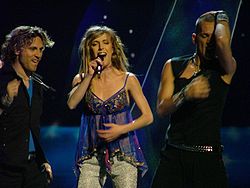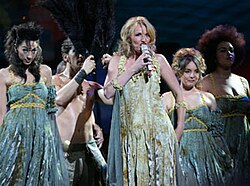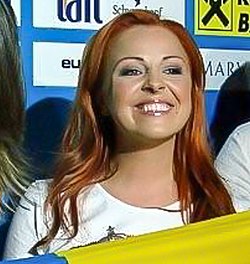Andorra in the Eurovision Song Contest
 From Wikipedia - Reading time: 14 min
From Wikipedia - Reading time: 14 min
| Andorra in the Eurovision Song Contest | |
|---|---|
| Eurovision Song Contest | |
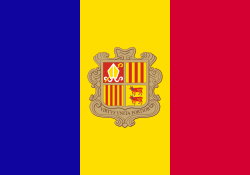
| |
| Participating broadcaster | Ràdio i Televisió d'Andorra (RTVA) |
| Participation summary | |
| Appearances | 6 (0 finals) |
| First appearance | 2004 |
| Last appearance | 2009 |
| Highest placement | 12th semi-final: 2007 |
| External links | |
| Andorra's page at Eurovision.tv | |
Andorra in the Eurovision Song Contest 2009 | |
Andorra has been represented at the Eurovision Song Contest six times, debuting in the 2004 contest and participating every year thereafter until the 2009 contest. The Andorran participating broadcaster in the contest is Ràdio i Televisió d'Andorra (RTVA). To date, Andorra remains the only nation to have never competed in a final, with its best result being a 12th-place finish in the 2007 contest's semi-final. Andorra withdrew from the contest following its 2009 appearance, with RTVA citing financial difficulties as the reason for its withdrawal. The country has not entered the contest again since. Interest in the contest has, however, remained high in the country, while statements from the Andorran government and broadcaster indicated that a future return was possible, depending on financial backing.
RTVA used a mixture of methods to select its entrants in the years it competed, employing a national final for 2004, 2005, and 2009 and selecting internally between 2006 and 2008. A televote was principally used to determine the nation's points, however, due to the country's small population, on occasion a jury was required as the number of votes received from the Andorran public was deemed too low to be considered valid.
Contest history
[edit]Participation in the Eurovision Song Contest is open to members of the European Broadcasting Union (EBU),[1] of which Ràdio i Televisió d'Andorra (RTVA) is a member since 2002.[2] Interest in Andorran participation in the contest was first raised in 2003, when the country's then-head of government Marc Forné Molné indicated his agreement for the country to enter the contest, seeing it as a way to raise their profile at a reasonable cost.[3][4] Andorra Televisió subsequently broadcast that year's contest as a passive participant, a prerequisite step for participation in the following year's event under the rules of the contest in place at the time.[5][6][7] RTVA later confirmed its intention to submit an entry for the 2004 contest, with backing from the Andorran government and an assurance that the Catalan language would be represented in the Eurovision Song Contest for the first time.[8][9]

For its first Eurovision appearance, an agreement was announced between RTVA and Televisió de Catalunya (TVC) to jointly organise Andorra's first national final, with viewers in Catalonia being given a say in who should represent the country in the 2004 contest.[10][11] Viewers and an assembled jury subsequently chose Marta Roure with "Jugarem a estimar-nos" as Andorra's first entry;[12][13] ultimately the nation did not fare well, placing 18th of the 22 participating countries in the semi-final, receiving 12 points in total, all from Spain, and failing to qualify for the grand final.[14] After debating employing an internal selection to determine Andorra's second entry, a second national final was organised ahead of the 2005 contest.[15] Marian van de Wal was chosen to perform "La mirada interior" at the contest, however Andorra once again failed to qualify for the final, placing 23rd of 25 countries in the 2005 semi-final with 27 points.[16][17]
RTVA initiated an internal selection to determine its entry for the 2006 contest, selecting "Sense tu" performed by Jenny;[18] the nation's third appearance would bring its worst result to date, placing last in the semi-final and receiving just eight points.[19] Further internal selections followed in 2007 and 2008, however neither Anonymous nor Gisela could bring Andorra to the final in either of the contests.[20][21][22] RTVA reverted to a national final for the 2009 contest, with Susanne Georgi selected by the Andorran public and jury to represent the country with "La teva decisió (Get a Life)";[23][24] on its sixth appearance, Andorra continued to fail to pass through the semi-final, placing 15th in the first semi-final with eight points and failing to qualify for the final.[25] After initially applying to take part in the Eurovision Song Contest 2010 in Oslo, Norway, RTVA subsequently announced its withdrawal from the contest, citing financial difficulties.[26]
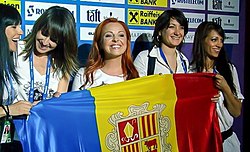
Budget restrictions have continued to prevent Andorra from returning to the contest, with RTVA having previously considered leaving the EBU in order to recoup costs, which would have prevented any further Andorran participation in the event.[27][28][29] In recent years, renewed interest in the contest has been reported among some members of the Andorran government, with past Andorran Eurovision artists having also been vocal in their support for a return of the nation to the contest.[30][31] Georgi, Andorra's last participant, also started a campaign to secure a potential sponsorship which would enable Andorra to return to the contest and lobbied with Andorran politicians on this idea.[32][33]
On 4 February 2025, Catalan radio station RAC 1 reported that Catalan broadcaster TV3 was in talks with RTVA with a proposal to collaborate on a potential return of the latter to the contest in 2026.[34][35] According to reports, it was proposed that TV3's music talent show Eufòria would be used to select Andorra's Eurovision representative.[36] On 26 May 2025, RTVA confirmed it would not participate in 2026 and would not collaborate with TV3 for a possible return.[37][38]
Andorra is the only country to have never participated in a final to date; 2007 remains the country's best result to date, when Anonymous placed 12th in that year's semi-final with 80 points, 11 points away from qualifying.[20][39]
Selection process
[edit]Andorra has used a mix of methods to select its entries for the contest, having employed both national finals and internal selections. For its debut entry, RTVA launched a casting show, Eurocàsting, to determine two acts to take part in the national final.[40][41] The selected acts performed 12 potential Eurovision songs over nine weeks on 12 punts, with songs being eliminated weekly until the winning song and artist was determined in the final show.[11][42] Eurocàsting returned in 2005, but with one winning artist selected to perform three songs in the single final show Desitja'm sort.[43][44] Following internal selections between 2006 and 2008, RTVA employed a televised competition again in 2009, with three acts competing in Passaport a Moscou.[18][21][22][45]
Voting
[edit]In the years where Andorra participated, voting at the Eurovision Song Contest typically consisted of 100 percent public televoting, with countries obligated to use televoting as the method for determining their points from the 2004 contest.[46] However, each country was obligated to assemble a back-up jury, whose votes would be used instead of the televote in cases of technical failure, or from 2005 when the number of televotes registered failed to pass a certain threshold.[46][47] RTVA utilised SMS voting to determine the country's points during the shows in which Andorra participated, however on occasion the back-up jury results were required to be implemented as the number of votes received was considered too low to provide a valid result.[47][48] This occurred in 2005 and 2007, when the votes of Andorra's back-up jury were used instead to provide the Andorran votes in both the semi-final and final.[47][49]
Participation overview
[edit]| ◁ | Last place |
| Year | Artist | Song | Language | Final | Points | Semi | Points |
|---|---|---|---|---|---|---|---|
| 2004 | Marta Roure | "Jugarem a estimar-nos" | Catalan[51] | Failed to qualify | 18 | 12 | |
| 2005 | Marian van de Wal | "La mirada interior" | Catalan[52] | 23 | 27 | ||
| 2006 | Jenny | "Sense tu" | Catalan[53] | 23 ◁ | 8 | ||
| 2007 | Anonymous | "Salvem el món" | Catalan, English[54] | 12 | 80 | ||
| 2008 | Gisela | "Casanova" | English[55] | 16 | 22 | ||
| 2009 | Susanne Georgi | "La teva decisió (Get a Life)" | Catalan, English[56] | 15 | 8 | ||
Related involvement
[edit]Heads of delegation
[edit]Each participating broadcaster in the Eurovision Song Contest assigns a head of delegation as the EBU's contact person and the leader of their delegation at the event. The delegation, whose size can greatly vary, includes a head of press, the performers, songwriters, composers, and backing vocalists, among others.[57]
| Year | Name | Ref. |
|---|---|---|
| 2005–2009 | Creu Rosell | [58] |
Commentators and spokespersons
[edit]
For the show's broadcast on Andorra Televisió (ATV), various commentators have provided commentary for the contest in the local language. At the Eurovision Song Contest after all points are calculated, the presenters of the show call upon each voting country to invite each respective spokesperson to announce the results of their vote on-screen.[59]
| Year(s) | Commentator | Dual commentator | Spokesperson | Ref. |
|---|---|---|---|---|
| 2003 | Meri Picart | Albert Roig | Did not participate | [60][61] |
| 2004 | Josep Lluís Trabal | Pati Molné | [58][62][63] | |
| 2005 | Ruth Gumbau | [58][64][65] | ||
| 2006 | Xavi Palma | [58][66][67] | ||
| 2007 | Marian van de Wal | [58][68][69] | ||
| 2008 | Alfred Llahí | [58][70][71] | ||
| 2009 | None | Brigits García | [59][72] | |
| 2010–2025 | No broadcast | Did not participate | ||
Photo gallery
[edit]-
Marta Roure in Istanbul (2004)
-
Marian van de Wal in Kyiv (2005)
-
Susanne Georgi in Moscow (2009)
References
[edit]- ^ "Which countries can take part?". European Broadcasting Union. Archived from the original on 17 March 2017. Retrieved 23 March 2021.
- ^ "EBU.ch :: EBU News–2002_07_19". European Broadcasting Union. 19 July 2002. Archived from the original on 7 August 2007. Retrieved 23 March 2021.
- ^ "El cap del govern, Marc Forné, partidari que Andorra participi en el festival d'Eurovisió" (in Catalan). Corporació Catalana de Mitjans Audiovisuals (CCMA). 16 March 2003. Archived from the original on 23 November 2017. Retrieved 23 March 2021.
- ^ Opheim, Bjørn Erik (6 March 2003). "Andorra prepares for Eurovision Song Contest 2004". ESCToday. Archived from the original on 8 November 2014. Retrieved 23 March 2021.
- ^ "ATV Eurovisió" (in Catalan). Ràdio i Televisió d'Andorra. Archived from the original on 9 October 2003. Retrieved 23 March 2021.
- ^ Bakker, Sietse (17 April 2003). "Andorra to Eurovision next year anyway?". ESCToday. Archived from the original on 28 July 2014. Retrieved 23 March 2021.
- ^ "Rules of the 2003 Eurovision Song Contest" (PDF). European Broadcasting Union. Archived (PDF) from the original on 27 January 2021. Retrieved 23 March 2021.
- ^ "El català serà present en el Festival d'Eurovisió del 2004 amb la participació d'Andorra" (in Catalan). Corporació Catalana de Mitjans Audiovisuals (CCMA). 27 March 2003. Archived from the original on 21 November 2017. Retrieved 23 March 2021.
- ^ Bakker, Sietse (2 July 2003). "Andorra to Eurovision Song Contest 2004". ESCToday. Archived from the original on 28 July 2014. Retrieved 23 March 2021.
- ^ "Els espectadors de TVC i d'Andorra TV triaran el representant del país pirinenc a Eurovisió" (in Catalan). Corporació Catalana de Mitjans Audiovisuals (CCMA). 24 November 2003. Archived from the original on 19 November 2017. Retrieved 23 March 2021.
- ^ a b "Informació del programa–12 punts" (in Catalan). Corporació Catalana de Mitjans Audiovisuals (CCMA). Archived from the original on 10 December 2020. Retrieved 24 March 2021.
- ^ Barak, Itamar (16 March 2004). "Marta Roure first Andorran entrant ever". ESCToday. Archived from the original on 8 August 2014. Retrieved 25 March 2021.
- ^ "Marta Roure, amb "Jugarem a estimar-nos", serà la primera que cantarà en català a Eurovisió" (in Catalan). Corporació Catalana de Mitjans Audiovisuals (CCMA). 16 March 2004. Archived from the original on 5 August 2020. Retrieved 27 March 2021.
- ^ "Results of the Semi-Final of Istanbul 2004". European Broadcasting Union. Archived from the original on 24 March 2021. Retrieved 24 March 2021.
- ^ Bakker, Sietse (20 October 2004). "Andorra to use easier selection format in 2005". ESCToday. Archived from the original on 18 November 2015. Retrieved 24 March 2021.
- ^ Philips, Roel (19 December 2004). "Marian van de Wal to represent Andorra". ESCToday. Archived from the original on 19 April 2014. Retrieved 24 March 2021.
- ^ "Results of the Semi-Final of Kyiv 2005". European Broadcasting Union. Archived from the original on 24 March 2021. Retrieved 24 March 2021.
- ^ a b Bakker, Sietse (9 March 2006). "Jenny to represent Andorra". ESCToday. Archived from the original on 24 March 2021. Retrieved 24 March 2021.
- ^ "Semi-Final of Athens 2006". European Broadcasting Union. Archived from the original on 27 March 2021. Retrieved 27 March 2021.
- ^ a b "Andorra–Eurovision Song Contest". European Broadcasting Union. Archived from the original on 16 March 2021. Retrieved 22 March 2021.
- ^ a b Royston, Benny (15 January 2007). "Andorra: Anonymous to Helsinki". ESCToday. Archived from the original on 30 July 2019. Retrieved 24 March 2021.
- ^ a b Hondal, Victor (10 December 2007). "Gisela officially presented as Andorra's entrant". ESCToday. Archived from the original on 4 March 2016. Retrieved 24 March 2021.
- ^ Klier, Marcus (4 February 2009). "Andorra: Susanna Georgi to Eurovision". ESCToday. Archived from the original on 5 February 2009. Retrieved 24 March 2021.
- ^ "Susanna Georgi representarà Andorra a Eurovisió". Enderrock. 5 February 2009. Archived from the original on 24 March 2021. Retrieved 24 March 2021.
- ^ "Results of the First Semi-Final of Moscow 2009". European Broadcasting Union. Archived from the original on 25 March 2021. Retrieved 25 March 2021.
- ^ Hondal, Victor (12 December 2009). "Definitely, no Andorra in Oslo". ESCToday. Archived from the original on 4 October 2015. Retrieved 24 March 2021.
- ^ Jiandani, Sergio (6 October 2010). "Confirmed: Andorra will not return in 2011". ESCToday. Archived from the original on 16 October 2017. Retrieved 24 March 2021.
- ^ Hondal, Victor (8 November 2011). "Andorra to quit EBU". ESCToday. Archived from the original on 11 November 2011. Retrieved 27 March 2021.
- ^ Hondal, Victor (20 June 2013). "Andorra to stay in EBU, no Eurovision return planned". ESCToday. Archived from the original on 12 September 2013. Retrieved 24 March 2021.
- ^ Cava, Joel (20 November 2019). "Andorra fa números per tornar a Eurovisió". El Nacional (in Catalan). Archived from the original on 21 November 2019. Retrieved 24 March 2021.
- ^ Fuster, Luis (21 November 2019). "La seva decisió–Andorra's government is reportedly willing to support a return to Eurovision". Wiwibloggs. Retrieved 24 March 2021.
- ^ Cortiles, Elisabet (19 May 2020). "Una empresa estrangera finançaria la participació d'Andorra a Eurovisió" (in Catalan). Ara Andorra. Archived from the original on 3 February 2021. Retrieved 24 March 2021.
- ^ Ryan, Tom (23 May 2020). "Susanne Georgi states she has secured funding for Andorra's participation". ESCXtra. Archived from the original on 2 June 2020. Retrieved 24 March 2021.
- ^ Adell, Daniel (4 February 2025). "El ganador de Eufòria podría representar a Andorra en Eurovisión 2026" [The winner of Eufòria could represent Andorra at the Eurovision 2026]. Eurovision-Spain.com (in Spanish). Retrieved 20 May 2025.
- ^ "TV3 pretende que el ganador del 'OT catalán' represente a Andorra en Eurovisión 2026" [TV3 wants the winner of the 'Catalan OT' to represent Andorra at Eurovision 2026]. The Objective (in Spanish). 4 February 2025. Retrieved 20 May 2025.
- ^ "Cataluña podría elegir el representante de Andorra en Eurovisión" [Catalonia could choose Andorra's Eurovision representative]. Europa FM (in Spanish). 5 February 2025. Retrieved 20 May 2025.
- ^ Heap, Steven. "Andorra: RTVA Will Not Participate in Eurovision 2026". Eurovoix. Retrieved 26 May 2025.
- ^ Jiandani, Sanjay (2025-06-03). "Andorra: RTVA confirms non participation at Eurovision 2026". ESCToday. Retrieved 2025-06-04.
- ^ "A look back at Andorra". Eurovision Song Contest. 25 July 2012. Archived from the original on 24 March 2019. Retrieved 25 March 2021.
- ^ Rodrigues, André (15 October 2003). "Eurocasting 2004: Casting in Andorra". ESCToday. Archived from the original on 2 November 2014. Retrieved 25 March 2021.
- ^ "Comencen les proves per triar el representant d'Andorra a Eurovisió" (in Catalan). Racó Català. 26 October 2003. Archived from the original on 12 December 2013. Retrieved 24 March 2021.
- ^ "Information about the national selection process in Andorra". Eurovision Song Contest. Archived from the original on 11 June 2004. Retrieved 24 March 2021.
- ^ "Andorra's national final". Eurovision Song Contest. Archived from the original on 17 April 2005. Retrieved 24 March 2021.
- ^ Philips, Roel (23 January 2005). "La mirada interior is the Andorran song for Kiev". ESCToday. Archived from the original on 4 March 2016. Retrieved 24 March 2021.
- ^ Floras, Stella (11 January 2009). "Andorra: National final details announced". ESCToday. Archived from the original on 24 March 2021. Retrieved 24 March 2021.
- ^ a b "Rules of the 2004 Eurovision Song Contest" (PDF). European Broadcasting Union. Archived (PDF) from the original on 25 May 2005. Retrieved 25 March 2021.
- ^ a b c "The end of a decade: Kyiv 2005". Eurovision Song Contest. 27 December 2009. Archived from the original on 8 May 2017. Retrieved 25 March 2021.
- ^ Philips, Roel (18 May 2005). "More information on the televoting". ESCToday. Archived from the original on 22 December 2015. Retrieved 25 March 2021.
- ^ Ulbricht, Alexej; Sircar, Indraneel; Slootmaeckers, Koen (2015). "Queer to be kind: Exploring Western media discourses about the "Eastern bloc" during the 2007 and 2014 Eurovision Song Contests" (PDF). Contemporary Southeastern Europe. 2. City, University of London: 155–172. Retrieved 27 March 2021.
Serbia could not vote for itself, and Albania and Andorra relied on backup national juries.
- ^ "Andorra". European Broadcasting Union. Archived from the original on 2 June 2022. Retrieved 27 May 2023.
- ^ Philips, Roel (28 April 2004). "Marta Roure to defend the Catalan language". ESCToday. Archived from the original on 30 November 2014. Retrieved 22 March 2021.
- ^ Philips, Roel (23 January 2005). "La mirada interior is the Andorran song for Kiev". ESCToday. Archived from the original on 4 March 2016. Retrieved 22 March 2021.
- ^ West-Soley, Richard (11 May 2006). "Andorran rehearsal and press conference complete". ESCToday. Archived from the original on 22 March 2021. Retrieved 22 March 2021.
- ^ Noutsos, Angelos (27 January 2019). "Slideback Sunday: The year when Andorra almost made it to the final". ESCXtra. Archived from the original on 26 November 2020. Retrieved 22 March 2021.
- ^ "Satisfying first Andorran rehearsal!". Eurovision Song Contest. 13 May 2008. Archived from the original on 13 May 2018. Retrieved 22 March 2021.
- ^ Kristiansen, Wivian Renee (27 July 2018). "An Xtra Happy Birthday; 27 July!". ESCXtra. Archived from the original on 22 March 2021. Retrieved 22 March 2021.
- ^ "Heads of Delegation". European Broadcasting Union. Archived from the original on 26 May 2019. Retrieved 27 May 2019.
- ^ a b c d e f "Europinions". Andorra Difusió. Archived from the original on 19 April 2014. Retrieved 22 March 2021.
- ^ a b Eurovision Song Contest 2009. Moscow, Russia. 14 May 2009.
- ^ "ATV Eurovisio" (in Catalan). Andorra Difusió. Archived from the original on 10 December 2003. Retrieved 6 December 2019.
- ^ Eurovision Song Contest 2003. Riga, Latvia. 24 May 2003.
- ^ Bakker, Sietse (14 May 2004). "And here are the votes from... the spokespersons". ESCToday. Archived from the original on 29 January 2007. Retrieved 20 November 2019.
- ^ "Andorra: Jury selects the three finalists". ESCToday. 13 December 2008. Archived from the original on 22 March 2021. Retrieved 22 March 2021.
- ^ Philips, Roel (17 May 2005). "The 39 spokespersons!". ESCToday. Archived from the original on 20 August 2017. Retrieved 22 March 2021.
- ^ Eurovision Song Contest 2005. Kyiv, Ukraine. 21 May 2005.
- ^ Bakker, Sietse (20 May 2006). "Meet the spokespersons for tonight's voting!". ESCToday. Archived from the original on 3 January 2018. Retrieved 22 March 2021.
- ^ Eurovision Song Contest 2006. Athens, Greece. 20 May 2006.
- ^ Klier, Marcus (24 April 2007). "Marian van de Wal to announce Andorran votes". ESCToday. Archived from the original on 4 March 2016. Retrieved 22 March 2021.
- ^ Eurovision Song Contest 2007. Helsinki, Finland. 12 May 2007.
- ^ Domènech, Albert (3 June 2008). "Alfred Llahí salva el chiki-chiki en Eurovisión". La Vanguardia (in Spanish). Archived from the original on 9 March 2016. Retrieved 22 March 2021.
- ^ Eurovision Song Contest 2008. Belgrade, Serbia. 24 May 2008.
- ^ Ventura Cardús, Núria (13 November 2016). "Un esclat d'il·lusió". Diari d'Andorra (in Catalan). Archived from the original on 14 November 2016. Retrieved 23 January 2023.
 KSF
KSF